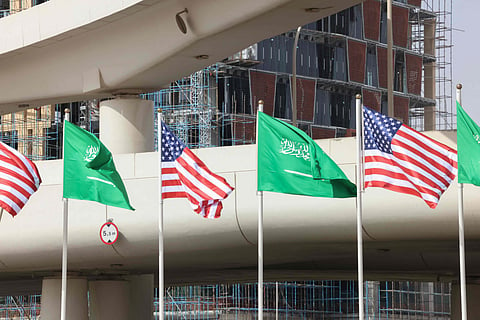Trump arrives in Saudi Arabia Tuesday on Gulf tour aiming for economic wins and stronger regional ties
The trip comes at a critical moment for US nuclear talks with Iran

DUBAI: US President Donald Trump’s Gulf tour starting Tuesday will take him to Saudi Arabia — a country he hopes will recognise Israel, the UAE and Qatar.
During his first term, Trump oversaw a series of normalisation deals between close ally Israel and several Arab countries.
Nearly five years ago the UAE joined the US-brokered Abraham Accords, along with Gulf neighbour Bahrain and North African kingdom Morocco.
A public opinion poll published by US think tank the Arab Center Washington DC in January 2024, about three months into the Gaza war, suggested that a majority of Saudis opposed recognising Israel.
In a similar survey in 2022, only 38 per cent expressed an objection.
Before the war, Saudi Arabia had engaged in preliminary discussions with Washington about establishing ties with Israel in exchange for a security agreement and support for a civilian nuclear programme.
But the kingdom has since clarified its position, saying it would not agree to normalisation without a Palestinian state.
Sanam Vakil of the Chatham House think tank said the Abraham Accords are “a case study for Saudi Arabia”, showing benefits in trade, investment and US ties but “limitations” on the Palestinian issue and people-to-people links.
Arriving in Riyadh on Tuesday with stops in Doha, Qatar and Abu Dhabi, later in the week, the trip echoes Trump’s first international foray in 2017.
“Now, eight years later, President Trump will return to reemphasise his continued vision for a proud, prosperous, and successful Middle East, where the United States and Middle Eastern nations are in cooperative relationships, and where extremism is defeated in place of commerce and cultural exchanges,” press secretary Karoline Leavitt told reporters, casting the trip as a “historic return to the Middle East.”
But much has changed in the global and economic world order since Trump’s first-term sojourn: The president has dramatically reimagined and reshaped the US’ role in the world in his first months in office, and the Russia-Ukraine and Israel-Hamas wars have upended stability in Europe and the Middle East.
Still, the trip offers Trump the chance to notch a few economic wins, revel in the pomp and circumstance of presidential visits, and highlight deepening partnerships, according to CNN.
And what goes unmentioned on the trip may prove just as important as what is said.
Trump’s counterparts are likely to roll out the literal and figurative red carpet for the American president. In 2017, Trump’s likeness was projected onto the side of the Ritz-Carlton hotel in Riyadh, and there could be similar efforts to welcome the American president this time by world leaders seen as friendly to the Trump administration.
“This is his happy place. His hosts will be generous and hospitable. They’ll be keen to make deals,” said Jon Alterman, director of the Middle East Program at the Center for Strategic and International Studies.
The specter of Iran
The trip comes at a critical moment for US nuclear talks with Iran, led by Trump’s envoy to the Middle East, Steve Witkoff, who has emerged as a top adviser and diplomat. Witkoff led a fourth round of high-stakes talks with his Iranian counterparts in Oman on Sunday.
A senior US official cast the talks as “encouraging” and said there were plans to “move forward” on technical aspects of the negotiations.
“Gulf states are cautiously supportive of the administration’s Iran nuclear talks, in part because they fear they’d be the first victims of a war with Iran,” Alterman said.
Trump has warned there will be consequences for Iran if a deal is not reached.
Sign up for the Daily Briefing
Get the latest news and updates straight to your inbox



